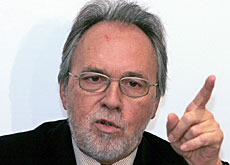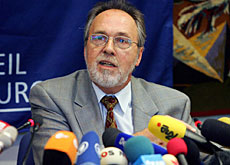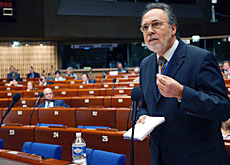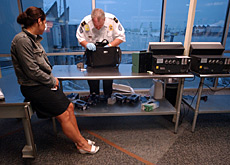Blacklist procedures “violate human rights”

A Council of Europe committee has adopted a report by a Swiss investigator that harshly criticises procedures used to blacklist people suspected of terrorist links.
It said the procedures used for blacklisting by the United Nations Security Council and the European Union were “totally arbitrary and have no credibility whatsoever”.
“These procedures must urgently be overhauled to make them fairer,” said the Legal Affairs Committee of the Council of Europe Parliamentary Assembly (PACE).
The committee made its announcement after approving a report by Switzerland’s Dick Marty, who said the blacklists violated basic human rights.
Presenting his report in Strasbourg on Monday, the Swiss politician said a “vague suspicion” is often enough for someone to be placed on a blacklist.
He said this was “similar to a death sentence” for individuals since their assets were frozen and they were prohibited from travelling abroad.
“Despite recent procedural improvements it remains almost impossible, in practice, to be removed from the blacklist – a situation that is illegal and unacceptable,” Marty wrote.
According to PACE, the UN Security Council has blacklisted some 370 individuals and 124 entities worldwide.
The Security Council first established a list of al Qaeda and Taliban suspects in 1999, and calls on UN member states to freeze assets and prevent the entry into their territories of anyone on the lists, and prevent the sale and transfer of arms to them.
EU list
Around 60 people are thought to be on the EU list, which was set up in the aftermath of the September 2001 terrorist attacks in New York and Washington.
“Even [those] deciding on the blacklisting of an individual are not fully informed of the reasons for a request put forward by one member,” the PACE resolution said.
“The person or group concerned is usually neither informed of the reasons for a request, nor given the possibility to be heard, nor even necessarily informed about the decision taken – until he or she first attempts to cross a border or use a bank account.”
PACE harshly criticised the Security Council and EU, saying such procedures were “unworthy” of them, and undermined the legitimacy of sanctions designed to combat terrorism.
Juridical safeguards
Marty called on both organisations to respect “minimal norms of procedure and juridical safeguards” before imposing restrictions. These norms include giving suspects the right to appeal to an independent and impartial organisation and the right to compensation in the case of any miscarriage of justice.
The Swiss expert highlighted the case of the People’s Mujahideen of Iran, which forms part of the National Council of Resistance of Iran and is on an EU blacklist despite a European Court ruling in 2006 saying it should be removed from the list.
The report is due to be debated by the Council of Europe’s plenary Parliamentary Assembly beginning on January 21, 2008.
In Marty’s role as investigator for the council, he previously took aim at CIA anti-terrorism operations, including the kidnapping and secret transfers of detainees.
He accused EU member states of knowing about the CIA operations including the clandestine transportation of foreign prisoners, often using European airspace.
swissinfo with agencies
Dick Marty was appointed by the Council of Europe in November 2005 to investigate claims that the CIA had set up secret prisons in eastern Europe.
In his initial report published in June 2006 he concluded that 14 European countries had colluded with the US in a “spider’s web” of human rights abuses.
Marty said other countries, including Switzerland, had been involved actively or passively in the detention or transfer of unknown persons.
On November 10, Marty was awarded the top prize by the Swiss branch of the International Society for Human Rights.

In compliance with the JTI standards
More: SWI swissinfo.ch certified by the Journalism Trust Initiative



You can find an overview of ongoing debates with our journalists here. Please join us!
If you want to start a conversation about a topic raised in this article or want to report factual errors, email us at english@swissinfo.ch.